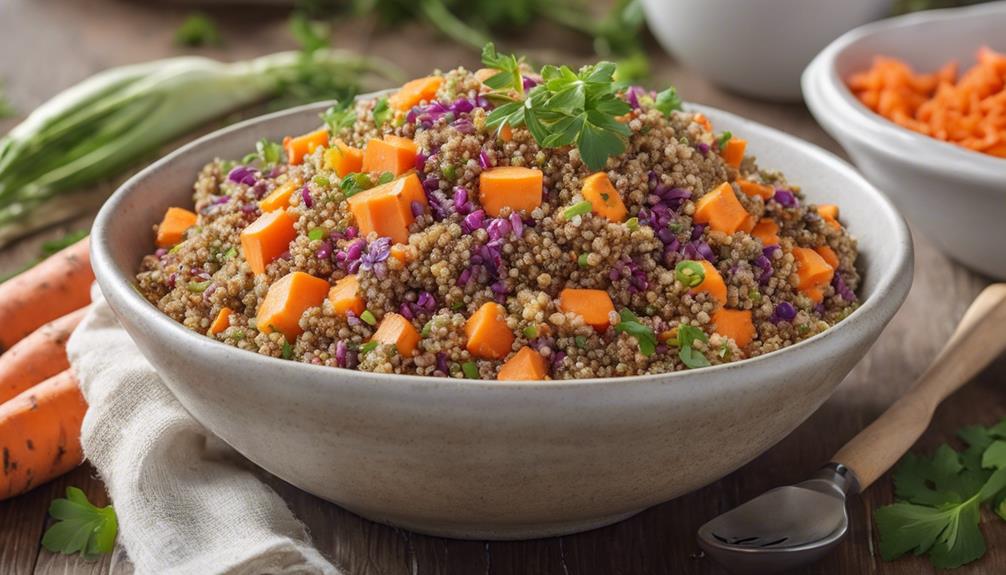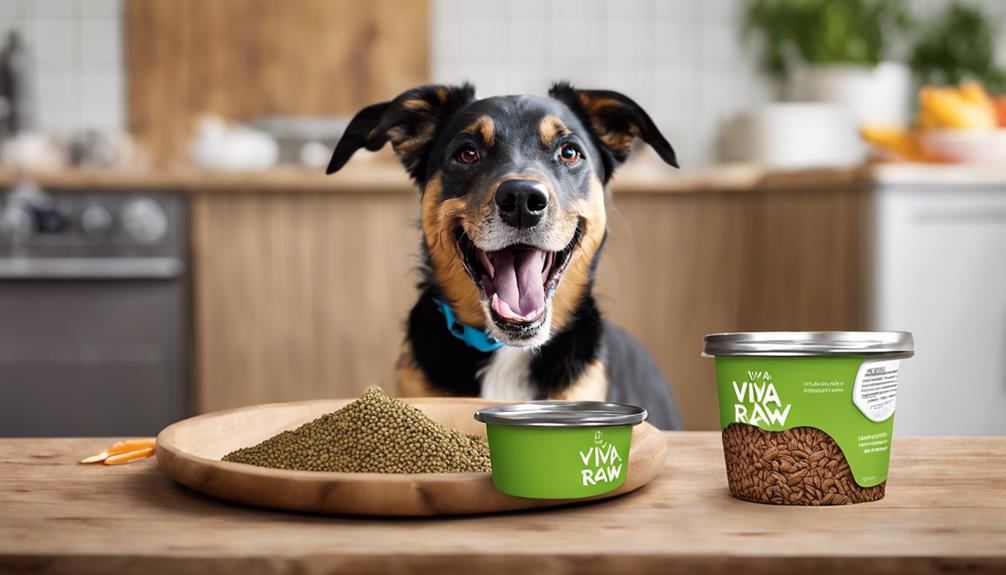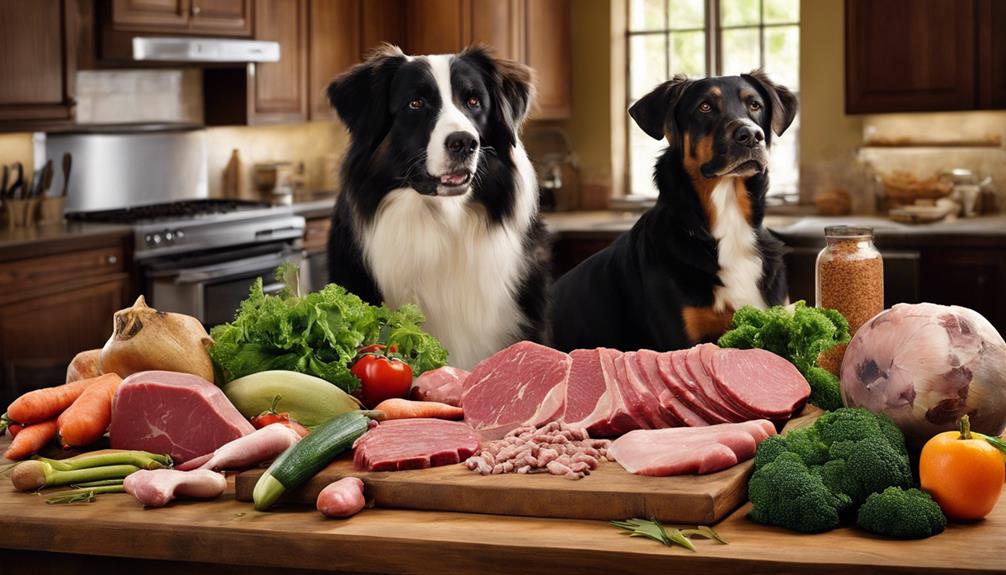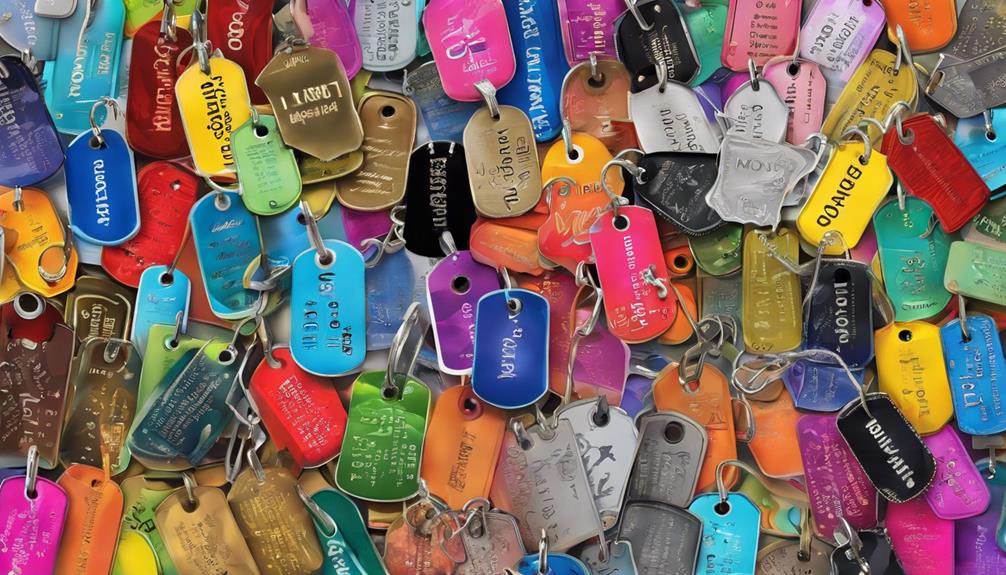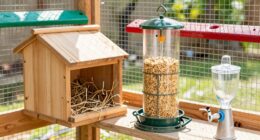If you greet your dog before your partner, it can create a warm environment and prevent behavior issues. Complimenting your dog strengthens your bond and shows love. When sharing dog pictures, try not to overdo it and involve your partner. Giving your dog a cute nickname deepens your connection. Sharing problems with your dog for comfort can help reduce stress. Neglecting your partner's allergies for your dog could harm their health. Make sure a healthy living space by keeping pet-free areas. These signs could indicate an imbalance in affections. They reveal room for improvement in balancing love for your pet and your partner.
Key Takeaways
- Greeting your dog first upon entering can indicate prioritizing the pet over the spouse.
- Showering your dog with compliments excessively may show more affection towards the pet.
- Posting dog pictures online obsessively can suggest a stronger focus on the pet than the spouse.
- Using an adorable nickname for your dog might signify a deeper connection with the pet than the spouse.
- Sharing problems with your pooch instead of your spouse can indicate a stronger emotional bond with the pet.
Greeting Your Dog First
When entering your home, it's important to greet your dog first to establish a warm and welcoming atmosphere. This simple act not only shows your furry friend that they're a priority in your interactions but also helps prevent behavior issues like separation anxiety. By giving your dog a warm welcome, you're creating a harmonious environment that benefits both your pet and your spouse. Neglecting to greet your dog first can lead to emotional scenes with your spouse, potentially causing tension and feelings of being unappreciated.
Maintaining a balanced approach by showing appreciation to both your dog and spouse is key to a healthy relationship. Your spouse should feel missed and appreciated just as much as your dog does. By incorporating greetings for both your dog and spouse, you're fostering a sense of harmony in your home. Remember, a little acknowledgment can go a long way in building strong and loving relationships with both your furry companion and your significant other.
Showering Your Dog With Compliments

To deepen the bond with your dog, it's important to shower them with compliments frequently, reinforcing their positive behaviors and traits. Dogs thrive on love and affection, just like humans do. By offering praises for their good behavior and unique qualities, you not only show your appreciation but also strengthen the bond you share with your furry friend.
When you express your admiration for your dog's loyalty and companionship, it creates a sense of connection and understanding between you both. Positive feedback through compliments is a powerful way to communicate your love and care for your dog. Remember, dogs understand our emotions and respond well to affectionate gestures.
Posting Dog Pictures Online Obsessively

When you flood your social media with endless dog photos, it can be a bit much for your friends and followers. Creating a separate account just for your furry friend indicates a serious dedication to sharing their every move online.
Remember to find a balance between showcasing your dog and sharing moments with your spouse to maintain a healthy representation of your priorities.
Social Media Oversharing
To strike a balance in sharing on your social media account, consider creating a separate profile dedicated solely to your furry friend.
It's crucial to respect the preferences of your friends and family by finding a middle ground between sharing photos of your dog and your spouse.
Be mindful of the frequency of posting pictures of your dog and make sure to include your spouse to avoid appearing overly focused on your pet.
Constant Photo Updates
Constantly bombarding your social media followers with an influx of dog pictures may indicate a skewed focus towards your pet over other important relationships in your life. While sharing adorable pet photos can be a fun way to express affection for your furry friends, it's vital to strike a balance.
Posting more pictures of your pets than your spouse might suggest a preference for your animals over your partner. Maintaining a healthy relationship involves showing overt affection to both your pets and your spouse, making sure that neither feels neglected.
Consider the frequency of your posts and make certain that your social media presence reflects a well-rounded display of love and appreciation for all members of your household.
Adorable Nickname for Your Dog

Choosing an endearing nickname for our furry friend can deepen the bond we share and demonstrate our affection towards them. A cute nickname for your dog is not just a label; it's a symbol of the special connection and love you have for your pet. Here's a table showcasing some adorable nicknames you can use for your beloved canine companion:
| Nickname | Description | Example |
|---|---|---|
| Pawsome Pal | Reflects your bond | "Hey, Pawsome Pal!" |
| Snuggle Pup | Emphasizes affection | "Come here, Snuggle Pup!" |
| Furry BFF | Highlights companionship | "My Furry BFF is the best!" |
| Wagging Wonder | Appreciates their joy | "Look at Wagging Wonder go!" |
These nicknames not only make your pet feel cherished but also enhance the relationship you share with them. So, pick a sweet moniker that resonates with you and your furry friend to strengthen your connection even more!
Sharing Problems With Your Pooch

When facing challenges, confiding in your furry friend can be soothing. Dogs make excellent listeners and provide a safe space for sharing concerns.
Remember to also communicate openly with your spouse for a balanced support system.
Dog as Therapist
Discussing personal issues with your dog can offer valuable emotional support and comfort, contributing to reduced stress levels and enhanced well-being. Dogs are excellent listeners, providing a therapeutic outlet for processing thoughts and feelings. Their unconditional love and non-judgmental nature create a safe space to share anxieties and troubles.
Through regular communication, a strong bond forms, further boosting your emotional health. Sharing problems with your dog is a beneficial way to alleviate stress and anxiety, promoting a sense of calm and security. This unique relationship serves as a form of therapy, where your furry friend becomes a trusted confidant, offering solace and understanding in times of need.
Canine Confidante Connection
Amid life's challenges, confiding in your canine companion can offer a soothing balm for the soul. Dogs provide emotional support and comfort, acting as non-judgmental listeners when you need to express your worries.
Their companionship creates a safe space for communication, allowing you to process thoughts and feelings without fear of criticism. When sharing personal issues with your pooch, you may feel a sense of relief and love that enhances the bond between you.
This therapeutic form of confidante connection can be a valuable tool in coping with stress and anxiety, as your furry friend lends a comforting ear and unwavering support in times of need.
Fur Friend Counseling
In times of distress, confiding in your furry companion can offer a source of solace and support. Dogs, with their attentive ears and comforting presence, can be wonderful allies when dealing with emotional turmoil. Sharing your feelings with your dog can be surprisingly therapeutic, providing a safe space to express yourself without judgment.
This form of communication not only strengthens the bond between you and your pet but also helps you navigate through difficult times. Seeking comfort from your dog is a healthy way to cope with stress and anxieties, allowing you to feel understood and loved.
Comparing Love From Spouse to Dog

When comparing the love from a spouse to that of a dog, understanding the distinct forms of affection each provides is essential for maintaining balanced relationships.
- Appreciate the Unique Qualities: Your dog offers unconditional love, while your spouse's love may come in different forms such as emotional support, companionship, and shared experiences. Appreciating these unique qualities can help you value both relationships equally.
- Avoid Prioritizing Your Dog: While it's natural to love your dog, it's important not to prioritize them over your spouse. Understanding and embracing diverse forms of affection and care from both parties can help maintain a healthy balance.
- Acknowledge Differences in Expressions: Your dog may show affection through wagging its tail and cuddles, while your spouse may express love through words, acts of service, or quality time. Acknowledging these differences can help you nurture both relationships effectively.
- Nurture the Connection: Embrace the unconditional love from your dog, but also nurture and value the deeper emotional connection with your spouse. Both relationships are important and can bring different kinds of fulfillment.
Ignoring Spouses Allergies for Dog

Neglecting your spouse's allergies for the sake of your dog can jeopardize their health and strain your relationship. Insisting that your dog sleeps in bed despite your spouse's allergies can lead to discomfort and potential health issues for your partner. Prioritizing your pet's comfort over your spouse's well-being can create conflicts and resentment within your relationship. Ignoring your spouse's allergies for the sake of your dog isn't important or vital. It can result in not only health risks for your partner but also emotional strain on your relationship.
To maintain a harmonious relationship, it's essential to create a pet-free sleeping area to accommodate your spouse's allergies. Showing consideration for your spouse's health by keeping your dog out of certain areas can help prevent conflicts and promote a healthy living environment for everyone. Balancing the needs of both your pet and spouse, especially regarding allergies, is crucial for a harmonious and happy relationship.
Frequently Asked Questions
Is It Normal to Love a Dog More Than Your Partner?
It's not uncommon to love a dog more than a partner. Many people feel a deep connection with their pets due to the unconditional love and support they provide.
Prioritizing a dog over a spouse can happen because of the companionship and loyalty pets offer. This emotional bond can lead to showing more affection, spending extra time, and meeting their needs first.
Loving a dog more than a partner is normal for some individuals.
How Do You Tell if Your Dog Loves You More Than Your Partner?
When determining if your dog loves you more than your partner, observe their behaviors. Dogs show affection through tail wagging, leaning against you, and seeking physical contact.
Look for signs of excitement when you return home, like jumping or bringing you toys. Pay attention to their body language for cues of adoration.
Do People Love Their Dogs More Than Their Partners?
We often prioritize our pets over partners for various reasons. From feeding them first to showering them with attention, pets hold a special place in our hearts.
While it may seem like we love our dogs more than our partners, it's important to remember that love can take different forms.
The bond we share with our furry friends is unique and unconditional, but it doesn't diminish the love we have for our human partners.
Do Dogs Know When You Are Upset With Them?
Dogs can indeed sense when you're upset with them. They pick up on our non-verbal cues and tone of voice to understand our emotions. When they sense disapproval, they may exhibit submissive behavior or avoid eye contact.
Using training and positive reinforcement can help improve communication with our furry friends. It's important to stay calm and consistent when addressing negative behaviors to maintain a healthy relationship with our dogs.
Conclusion
In summary, it's vital to show love and affection to both your dog and your spouse. However, it's essential to maintain a healthy balance in your relationships.
Did you know that 94% of dog owners consider their furry friends to be a part of the family? Remember to prioritize communication, understanding, and respect with all your loved ones, whether they've two legs or four.

